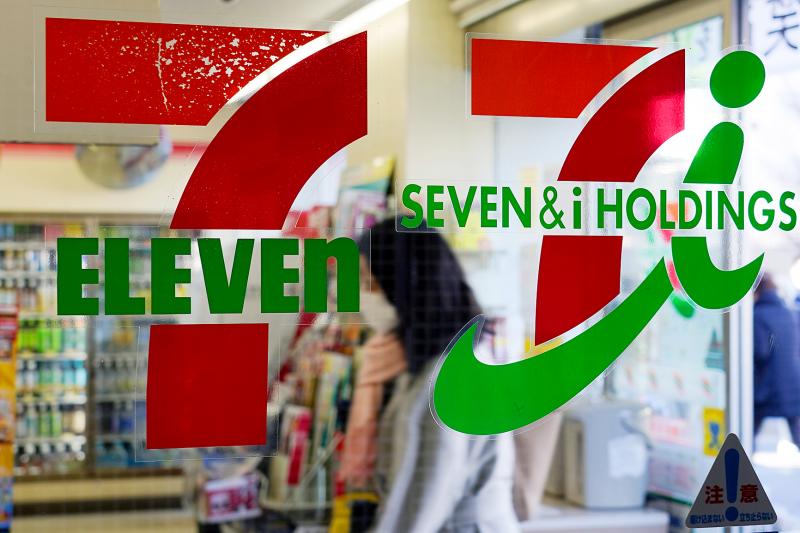Seven & i Holdings Co’s China-based convenience store business was fined for identifying Taiwan as an independent country on its Web site, the latest crackdown by China against companies over its stance on disputed territories.
Seven & i operates the 7-Eleven chain of convenience stores.
Fines of about 150,000 yuan (US$23,530) were imposed by the Beijing local authority against Seven & i, a spokesman for the Japanese retailer said, confirming an earlier report in the Nikkei newspaper.

Photo: Bloomberg
Enterprises operating in China — from Gap Inc and Daimler AG, to airlines including United Continental Holdings Inc and ANA Holdings Inc — have apologized or changed their Web sites after depicting Taiwan as a separate state. The companies usually comply, accepting it as part of the cost of doing business in China.
Seven & i “is taking the issue seriously and making sure to prevent a recurrence,” the company’s spokesman said.
Beijing’s municipal authorities last month issued the fine and a warning, a government-linked credit information Web site showed. Seven & i also failed to use Chinese names for some South China Sea islands as well as for the disputed Diaoyu Islands (釣魚島), known as the Senkaku Islands in Japan, and which are also claimed by Taiwan.
The map contained alleged errors in labeling some borders along the Xinjiang Uyghur Autonomous Region and Tibet Autonomous Region, the online report said.
While Hong Kong and Macau are special administrative regions with greater autonomy, Beijing also objects to references indicating that they are independent.

Hon Hai Precision Industry Co (鴻海精密) yesterday said that its research institute has launched its first advanced artificial intelligence (AI) large language model (LLM) using traditional Chinese, with technology assistance from Nvidia Corp. Hon Hai, also known as Foxconn Technology Group (富士康科技集團), said the LLM, FoxBrain, is expected to improve its data analysis capabilities for smart manufacturing, and electric vehicle and smart city development. An LLM is a type of AI trained on vast amounts of text data and uses deep learning techniques, particularly neural networks, to process and generate language. They are essential for building and improving AI-powered servers. Nvidia provided assistance

STILL HOPEFUL: Delayed payment of NT$5.35 billion from an Indian server client sent its earnings plunging last year, but the firm expects a gradual pickup ahead Asustek Computer Inc (華碩), the world’s No. 5 PC vendor, yesterday reported an 87 percent slump in net profit for last year, dragged by a massive overdue payment from an Indian cloud service provider. The Indian customer has delayed payment totaling NT$5.35 billion (US$162.7 million), Asustek chief financial officer Nick Wu (吳長榮) told an online earnings conference. Asustek shipped servers to India between April and June last year. The customer told Asustek that it is launching multiple fundraising projects and expected to repay the debt in the short term, Wu said. The Indian customer accounted for less than 10 percent to Asustek’s

‘DECENT RESULTS’: The company said it is confident thanks to an improving world economy and uptakes in new wireless and AI technologies, despite US uncertainty Pegatron Corp (和碩) yesterday said it plans to build a new server manufacturing factory in the US this year to address US President Donald Trump’s new tariff policy. That would be the second server production base for Pegatron in addition to the existing facilities in Taoyuan, the iPhone assembler said. Servers are one of the new businesses Pegatron has explored in recent years to develop a more balanced product lineup. “We aim to provide our services from a location in the vicinity of our customers,” Pegatron president and chief executive officer Gary Cheng (鄭光治) told an online earnings conference yesterday. “We

LEAK SOURCE? There would be concern over the possibility of tech leaks if TSMC were to form a joint venture to operate Intel’s factories, an analyst said Taiwan Semiconductor Manufacturing Co (TSMC, 台積電) yesterday stayed mum after a report said that the chipmaker has pitched chip designers Nvidia Corp, Advanced Micro Devices Inc and Broadcom Inc about taking a stake in a joint venture to operate Intel Corp’s factories. Industry sources told the Central News Agency (CNA) that the possibility of TSMC proposing to operate Intel’s wafer fabs is low, as the Taiwanese chipmaker has always focused on its core business. There is also concern over possible technology leaks if TSMC were to form a joint venture to operate Intel’s factories, Concord Securities Co (康和證券) analyst Kerry Huang (黃志祺)